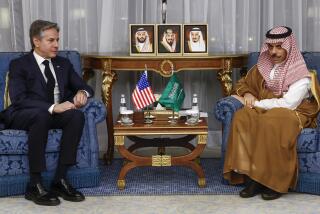Kerry’s Cairo visit underlines differences between U.S., Egypt
CAIRO—Secretary of State John F. Kerry paid a brief visit to Egypt on Sunday that was meant to smooth over recent rifts, but laid bare the two countries’ differences over authoritarian practices of the military-backed government that supplanted the country’s first democratically elected leader.
Kerry’s stopover, at the start of a nine-day trip, was the highest-level American visit since the July 3 coup that toppled unpopular Islamist President Mohamed Morsi, and a bloody dispersal of his followers in the Muslim Brotherhood in mid-August that left about 1,000 dead. The Obama administration angered Egyptian officials with criticism of the crackdown, and anti-American sentiment here has since been running high.
Kerry arrived at a particularly fraught moment: the eve of Morsi’s trial. The State Department stressed that the timing of the visit had nothing to do with the legal proceedings against the former president, but Egypt’s official press has been full of speculation that Kerry’s aim in visiting was to somehow derail the trial, which opens Monday.
The visit was not announced in advance by the State Department, a level of secrecy normally employed when senior officials visit war-zone destinations such as Kabul, Afghanistan, or Baghdad. Security was unprecedentedly tight, with sensitive sites locked down by security forces in advance of the trial, and the capital’s already snarled traffic at a near-standstill as a result.
Even while Kerry was on the ground, Egyptian state media crowed that his presence showed that the United States had accepted the “irreversibility” of Morsi’s removal. The secretary of State did not allude to that; instead, he repeated U.S. calls for Egyptian officials to move toward the restoration of democratic rule and respect “fundamental freedoms” in the meantime.
“We support you in this tremendous transition you are undergoing,” Kerry said, addressing the Egyptian people directly at a joint news conference with Foreign Minister Nabil Fahmy. “We know it’s difficult, and we want to help.”
Prior to Kerry’s arrival, Fahmy spoke openly of Egypt’s intention to court other allies, such as Russia and Saudi Arabia, to make up for the loss of hundreds of millions of dollars in American aid to Egypt’s powerful military. And he made it clear that Egypt would not welcome interference in its internal affairs.
After leaving Cairo, Kerry flew to Riyadh, Saudi Arabia, where efforts at fence-mending were also a dominant theme. Saudi leaders have been sharply critical of the Obama administration in recent weeks, making unusually vocal public complaints about U.S. policy on Syria and Saudi rival Iran.
After the Saudi visit, the secretary of State was to travel to Poland before returning for a regional swing through Israel, the West Bank, Jordan, the United Arab Emirates, Algeria and Morocco.
ALSO:
Two French journalists abducted and killed in Mali
Snowden won’t pose a threat to U.S., Putin aide says
Revenge a concern after drone killing of Pakistani Taliban leader
More to Read
Sign up for Essential California
The most important California stories and recommendations in your inbox every morning.
You may occasionally receive promotional content from the Los Angeles Times.










